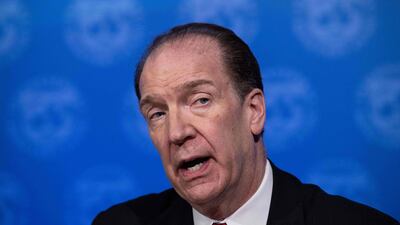The World Bank’s executive board is expected to this week consider the first fast-track funds to help Afghanistan and Ethiopia respond to the coronavirus pandemic, its president said on Sunday.
In a LinkedIn blog on Sunday, David Malpass said funding for the projects could come out of a $14 billion (Dh51.42bn) Fast Track Facility approved last week to help countries deal with health and economic effects of the coronavirus.
The respiratory disease has infected more than 305,000 people around the world, and killed more than 13,000.
Mr Malpass said World Bank teams were preparing projects in 40 countries for up to $1.7bn under the fund.
Projects in Afghanistan and Ethiopia were the most advanced and would be presented to the board this week, he said, preparing them for formal approval.
Work was also advancing on projects in 14 other countries, Mr Malpass said, without identifying them.
These projects could then be quickly replicated in other parts of the same country, through funding from other development banks or in other countries.
The bank and the International Finance Corporation, its private sector arm, were to free up $1.5bn in Covid-19 funding in 24 countries by restructuring existing projects, Mr Malpass said.
The corporation was also trying to start extending trade finance and working capital lines to clients, with regular board action expected in the next two to four weeks.
Mr Malpass said bank officials were in close touch with finance ministers and central bankers from around the world to discuss their needs and responses to the crisis.
Bank officials had also identified ways to support countries as they race to procure much-needed medical equipment and upgrade health facilities.

